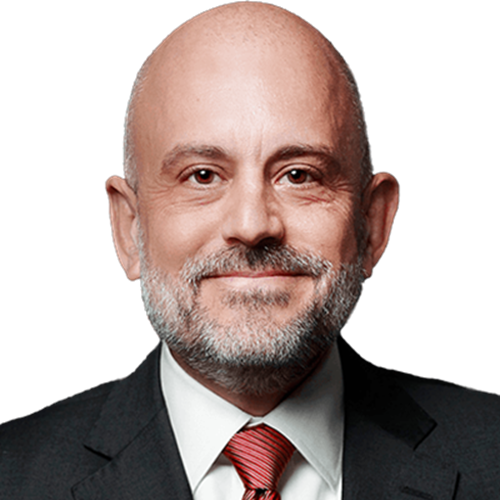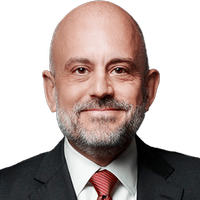Building Your Financial Plan Around Cash Flow
The process is a lot like putting a puzzle together.

Profit and prosper with the best of Kiplinger's advice on investing, taxes, retirement, personal finance and much more. Delivered daily. Enter your email in the box and click Sign Me Up.
You are now subscribed
Your newsletter sign-up was successful
Want to add more newsletters?

Delivered daily
Kiplinger Today
Profit and prosper with the best of Kiplinger's advice on investing, taxes, retirement, personal finance and much more delivered daily. Smart money moves start here.

Sent five days a week
Kiplinger A Step Ahead
Get practical help to make better financial decisions in your everyday life, from spending to savings on top deals.

Delivered daily
Kiplinger Closing Bell
Get today's biggest financial and investing headlines delivered to your inbox every day the U.S. stock market is open.

Sent twice a week
Kiplinger Adviser Intel
Financial pros across the country share best practices and fresh tactics to preserve and grow your wealth.

Delivered weekly
Kiplinger Tax Tips
Trim your federal and state tax bills with practical tax-planning and tax-cutting strategies.

Sent twice a week
Kiplinger Retirement Tips
Your twice-a-week guide to planning and enjoying a financially secure and richly rewarding retirement

Sent bimonthly.
Kiplinger Adviser Angle
Insights for advisers, wealth managers and other financial professionals.

Sent twice a week
Kiplinger Investing Weekly
Your twice-a-week roundup of promising stocks, funds, companies and industries you should consider, ones you should avoid, and why.

Sent weekly for six weeks
Kiplinger Invest for Retirement
Your step-by-step six-part series on how to invest for retirement, from devising a successful strategy to exactly which investments to choose.
When my kids were growing up, many days my wife would sit with them on the floor putting puzzles together. They would laugh and talk as they worked together arranging the pieces to create the picture on the box.
When the kids were young, the puzzles consisted of 20 pieces that could be put together without much need for the picture on the box. The older the kids got, the more complex the puzzles became and the more important the picture became for them to fully study, understand and refer back to in order to complete the puzzle.
The same is true for a financial plan. When someone is just getting started with his or her financial life, the process can seem rudimentary without much consideration. However, as assets are accumulated and life becomes more complex, the picture on the box becomes the most important part of assembling the puzzle.
From just $107.88 $24.99 for Kiplinger Personal Finance
Become a smarter, better informed investor. Subscribe from just $107.88 $24.99, plus get up to 4 Special Issues

Sign up for Kiplinger’s Free Newsletters
Profit and prosper with the best of expert advice on investing, taxes, retirement, personal finance and more - straight to your e-mail.
Profit and prosper with the best of expert advice - straight to your e-mail.
The Importance of the Picture on the Box
Think of your personal financial situation as a puzzle made up of dozens of pieces. The pieces represent all of the products, programs, thoughts, decisions, purchases, ideas, investments and anything else involving your financial life.
The picture on the box to your puzzle is your CASH FLOW. It’s where everything flows from and where everything originates. It’s where the most important decisions are made and is the most important aspect of planning to understand. You simply cannot fully put the puzzle together without the picture.
Yet, most people work around the edges of their puzzle and don’t take the time to study the picture. People will spend their time talking and debating about the pieces without considering the picture on the box. It’s similar to what often happens during financial or retirement planning. Instead of working to fulfill the picture on the box, focusing on the completion of the puzzle rather than the individual pieces, they go from one idea or adviser to the next focused on products and rates of return. The puzzle is never complete.
What is cash flow?
Cash flow is understanding where money originates. It’s about strategically using money to not only live your life but to create more income sources for yourself. When you put your focus on cash flow, it solves a hundred other decisions.
The confusing part about cash flow is that too few people understand what this really is. They believe that a monthly budget represents their cash flow. It doesn’t.
A budget is used to track expenses. It focuses on limiting them to stay within your means in order to save money. It is a mindset of scarcity and is like using a rearview mirror for managing money. A budget is merely a piece of your puzzle.
Cash flow is the picture. It focuses on where your money needs to go to fulfill the goals that you have for your future. It is like looking through a windshield to see where you are going and allows you to direct money toward creating wealth and ultimately more income. It is an abundance mindset, not a scarcity mindset.
The purpose of cash flow awareness is not simply to make ends meet, but rather to properly organize the flow of money, which allows you to create wealth and avoid debt.
How to Build a Plan Based on Cash Flow
Developing the picture on the box and assembling the pieces is a fairly straightforward process. It doesn’t require a great deal of time if you follow a few basic steps. When you think of your cash flow, break down your annual expenses into five groupings:
- Debt payments
- Tax payments
- Regular monthly expenses
- Savings and insurance transactions
- Irregular expenses throughout the year
Then list in chronological order the big-ticket items you plan to spend money on in chunks over the next five to 10 years. (This would include education, transportation, home improvements, etc.)
It is important to include the assets you plan to purchase or invest in to create more income on this list. This may be a business, rental property or some other income-producing asset you plan to acquire.
During this stage of the process, don’t think about how you will pay for these big-ticket items, just list what they are, and then circle back later to strategize as part of a financial planning process to work out the details. Take a few minutes to complete this exercise. Once you do, you’ll discover whether your current cash flow is in alignment with your plans or if adjustments need to be made.
Defining your intention for the money you have allows you to begin assembling your financial plan in a strategic, chronological manner to seek opportunities for developing new income sources. The goal is to ultimately generate enough income from your assets to satisfy these big-ticket purchases and support your entire lifestyle.
That is how financial independence is achieved.
Securities offered through Kalos Capital Inc., Member FINRA/SIPC/MSRB, and investment advisory services offered through Kalos Management Inc., an SEC registered Investment Advisor, both located at11525 Park Wood Circle, Alpharetta, GA 30005. Kalos Capital Inc. and Kalos Management Inc. do not provide tax or legal advice. Skrobonja Financial Group LLC and Skrobonja Insurance Services LLC are not an affiliate or subsidiary of Kalos Capital Inc. or Kalos Management Inc.
Securities offered only by duly registered individuals through Madison Avenue Securities, LLC. (MAS), Member FINRA & SIPC. Advisory services offered only by duly registered individuals through AE Wealth Management (“AEWM”), a registered investment adviser. Skrobonja Financial Group, LLC, Skrobonja Insurance Services, LLC, AEWM and MAS are not affiliated entities. The article and opinions in this publication are for general information only and are not intended to provide specific advice or recommendations for any individual. We suggest that you consult your accountant, tax or legal adviser with regard to your individual situation.
Profit and prosper with the best of Kiplinger's advice on investing, taxes, retirement, personal finance and much more. Delivered daily. Enter your email in the box and click Sign Me Up.

Brian Skrobonja is a Chartered Financial Consultant (ChFC®) and Certified Private Wealth Advisor (CPWA®), as well as an author, blogger, podcaster and speaker. He is the founder and president of a St. Louis, Mo.-based wealth management firm. His goal is to help his audience discover the root of their beliefs about money and challenge them to think differently to reach their goals. Brian is the author of three books, and his Common Sense podcast was named one of the Top 10 podcasts by Forbes. In 2017, 2019, 2020, 2021 and 2022, Brian was awarded Best Wealth Manager. In 2021, he received Best in Business and the Future 50 in 2018 from St. Louis Small Business.
-
 Dow Adds 1,206 Points to Top 50,000: Stock Market Today
Dow Adds 1,206 Points to Top 50,000: Stock Market TodayThe S&P 500 and Nasdaq also had strong finishes to a volatile week, with beaten-down tech stocks outperforming.
-
 Ask the Tax Editor: Federal Income Tax Deductions
Ask the Tax Editor: Federal Income Tax DeductionsAsk the Editor In this week's Ask the Editor Q&A, Joy Taylor answers questions on federal income tax deductions
-
 States With No-Fault Car Insurance Laws (and How No-Fault Car Insurance Works)
States With No-Fault Car Insurance Laws (and How No-Fault Car Insurance Works)A breakdown of the confusing rules around no-fault car insurance in every state where it exists.
-
 For the 2% Club, the Guardrails Approach and the 4% Rule Do Not Work: Here's What Works Instead
For the 2% Club, the Guardrails Approach and the 4% Rule Do Not Work: Here's What Works InsteadFor retirees with a pension, traditional withdrawal rules could be too restrictive. You need a tailored income plan that is much more flexible and realistic.
-
 Retiring Next Year? Now Is the Time to Start Designing What Your Retirement Will Look Like
Retiring Next Year? Now Is the Time to Start Designing What Your Retirement Will Look LikeThis is when you should be shifting your focus from growing your portfolio to designing an income and tax strategy that aligns your resources with your purpose.
-
 I'm a Financial Planner: This Layered Approach for Your Retirement Money Can Help Lower Your Stress
I'm a Financial Planner: This Layered Approach for Your Retirement Money Can Help Lower Your StressTo be confident about retirement, consider building a safety net by dividing assets into distinct layers and establishing a regular review process. Here's how.
-
 The 4 Estate Planning Documents Every High-Net-Worth Family Needs (Not Just a Will)
The 4 Estate Planning Documents Every High-Net-Worth Family Needs (Not Just a Will)The key to successful estate planning for HNW families isn't just drafting these four documents, but ensuring they're current and immediately accessible.
-
 Love and Legacy: What Couples Rarely Talk About (But Should)
Love and Legacy: What Couples Rarely Talk About (But Should)Couples who talk openly about finances, including estate planning, are more likely to head into retirement joyfully. How can you get the conversation going?
-
 How to Get the Fair Value for Your Shares When You Are in the Minority Vote on a Sale of Substantially All Corporate Assets
How to Get the Fair Value for Your Shares When You Are in the Minority Vote on a Sale of Substantially All Corporate AssetsWhen a sale of substantially all corporate assets is approved by majority vote, shareholders on the losing side of the vote should understand their rights.
-
 How to Add a Pet Trust to Your Estate Plan: Don't Leave Your Best Friend to Chance
How to Add a Pet Trust to Your Estate Plan: Don't Leave Your Best Friend to ChanceAdding a pet trust to your estate plan can ensure your pets are properly looked after when you're no longer able to care for them. This is how to go about it.
-
 Want to Avoid Leaving Chaos in Your Wake? Don't Leave Behind an Outdated Estate Plan
Want to Avoid Leaving Chaos in Your Wake? Don't Leave Behind an Outdated Estate PlanAn outdated or incomplete estate plan could cause confusion for those handling your affairs at a difficult time. This guide highlights what to update and when.
